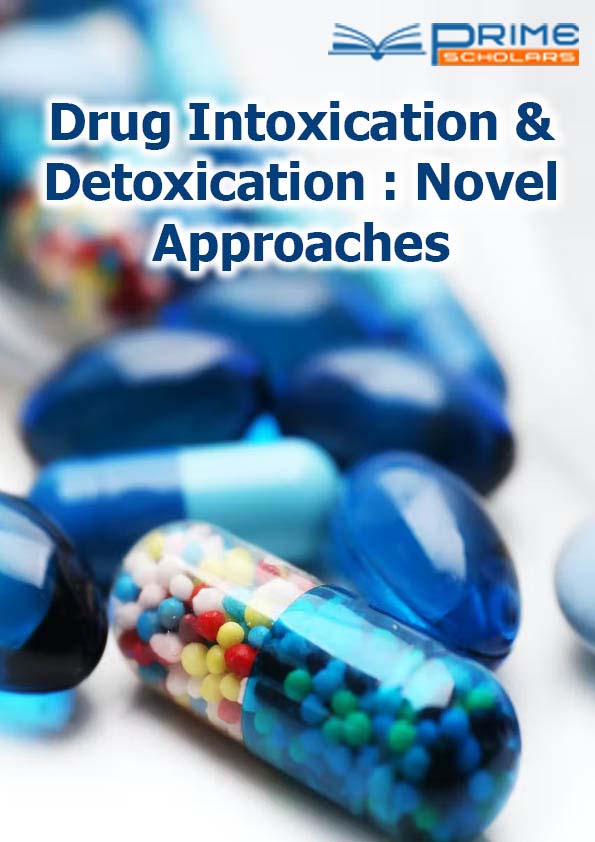Commentary - (2023) Volume 4, Issue 3
The Looming Crisis: Drug Intoxication's Silent Stranglehold
Mark Twain*
Department of Pharmacology, Harvard University, USA
*Correspondence:
Mark Twain,
Department of Pharmacology, Harvard University,
USA,
Email:
Received: 30-Aug-2023, Manuscript No. DIDNA-23-17910;
Editor assigned: 01-Sep-2023, Pre QC No. DIDNA-23-17910 (PQ);
Reviewed: 15-Sep-2023, QC No. DIDNA-23-17910;
Revised: 20-Sep-2023, Manuscript No. DIDNA-23-17910 (R);
Published:
27-Sep-2023, DOI: 10.36648/DIDNA 4.3.21
Description
In an era marked by rapid societal changes, drug intoxication
stands as a persistent and escalating issue that continues to
wreak havoc on communities worldwide. As we delve into the
intricate web of this problem, it becomes apparent that addressing
it requires a multifaceted approach that transcends
traditional approaches to substance abuse. Drug intoxication
isn’t confined to any specific demographic, socioeconomic
status, or geographical location. It is a scourge that touches
the lives of countless individuals and their families, shattering
dreams and leaving behind a trail of devastation. From the
opiate epidemic in the United States to the surge in synthetic
drugs in Asia, drug intoxication is a complex issue that defies
simple solutions. One of the most alarming aspects of drug intoxication
is its clandestine nature. Unlike other public health
crises, the effects of drug intoxication are often hidden from
plain sight. We frequently envision addiction as the face of this
problem, but drug intoxication encompasses a wider spectrum,
including both acute and chronic usage, involving a wide range
of substances. These substances can vary from opioids and amphetamines
to prescription medications and designer drugs. As
a result, it can be challenging to quantify the full extent of the
problem.
The issue of drug intoxication extends beyond the immediate
harm to users; it permeates the fabric of our communities.
Crimes associated with drug use, such as theft and violence,
contribute to an atmosphere of insecurity and instability. Embracing
harm reduction strategies, such as safe injection sites,
needle exchange programs, and drug education, is a step in the
right direction. Furthermore, providing comprehensive mental
health services and access to addiction treatment is crucial.
It’s often overlooked that many individuals turn to drugs as a
means of self-medicating for underlying mental health issues.
Treating addiction without addressing these root causes is akin
to trying to douse a fire while ignoring the fuel source. Society
should recognize addiction as a disease rather than a moral
failing, emphasizing empathy and rehabilitation over punishment.
Another vital component in addressing drug intoxication
is prevention and education. Adolescents and young adults are
particularly vulnerable to experimentation with drugs, often
underestimating the potential dangers. Schools, families, and
communities should work collaboratively to provide accurate
information about the risks associated with drug use and promote
positive alternatives to substance abuse. Prevention efforts
should be proactive and ongoing, reaching individuals before
they even consider drug experimentation. The digital age
has also brought a new dimension to drug intoxication, with
online drug marketplaces flourishing on the dark web. Governments
and law enforcement agencies must adapt to this ever-
evolving landscape, employing technology and international
cooperation to combat the proliferation of online drug sales.
In conclusion, drug intoxication is a multifaceted issue that requires
a comprehensive, empathetic, and innovative response.
Approaches based on punitive measures alone have proven
to be inadequate, and it’s time for society to embrace a more
compassionate approach that prioritizes harm reduction, treatment,
and prevention. To address the crisis of drug intoxication
effectively, we must destigmatize addiction, provide accessible
mental health services, and educate our communities about
the risks of drug use. Only through a collective effort that transcends
traditional boundaries can we hope to mitigate the silent
stranglehold that drug intoxication holds over our society.
It’s a challenge that cannot be ignored, for the consequences of
inaction are too grave and far-reaching.
Acknowledgement
None.
Conflict Of Interest
The author’s declared that they have no conflict of interest.
Citation: Twain A (2023) The Looming Crisis: Drug Intoxication’s Silent Stranglehold. Drug Intox Detox: Novel Approaches. 4:21.
Copyright: © 2023 Twain M. This is an open-access article distributed under the terms of the Creative Commons Attribution
License, which permits unrestricted use, distribution, and reproduction in any medium, provided the original author and source
are credited.
